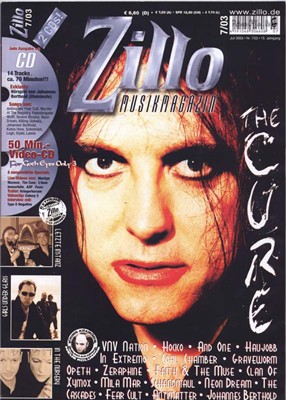
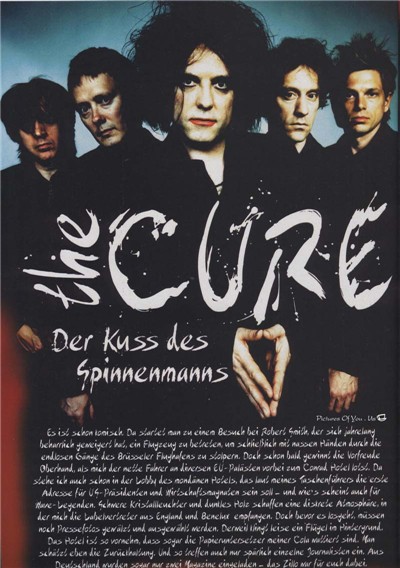
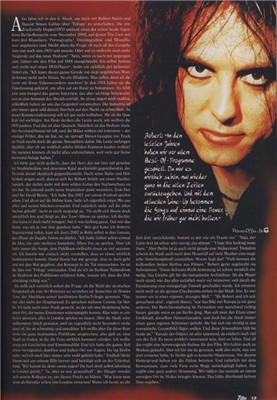
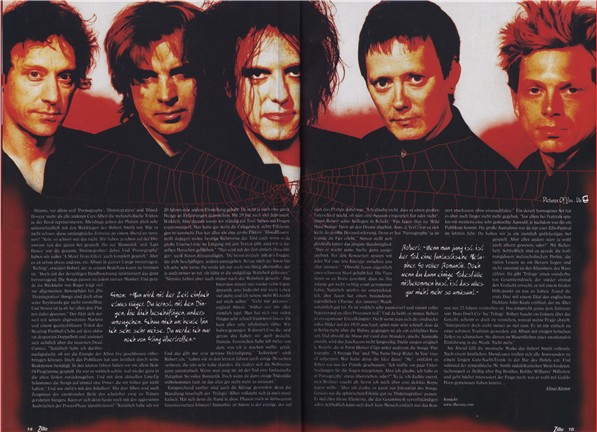
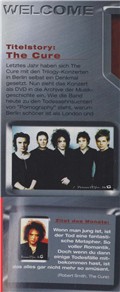
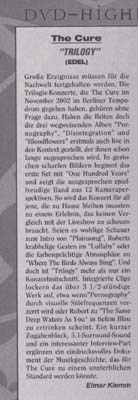
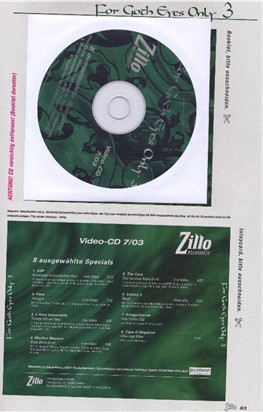
The Kiss of Spiderman
By Elmar Klemm
Enticer from table of contents page: Last
year in Berlin The Cure created a memorial to themselves with the
Trilogy Concerts. Now on DVD the concerts stand in the archives of music
history. Robert Smith and Simon Gallup
reveal in this big Zillo interview where the band stands today on the
yearning for death, why Berlin is nicer than
London and what David Bowie has do to with it all.
Interview:
It is already crazy. This is where a visit
with Robert Smith, who for years persistently refused to step on a plane,
finally takes off - with wet hands, tripping through the endless halls of the
Brussel Airport. How quickly the early
fears win the upper hand as the nice driver pilots me, as a diversion, past
the EU palaces to the Conrad Hotel.
Here I stand in the lobby of the mundane hotel that my pocket guide says has
been the first address for US
Presidents and industry magnets and, it seems, for Wave legends. Heavy
crystal lamps and dark wood create a
discrete atmosphere in which the agents from England and Benelux have
captured me. But, before anything
happens press photos must be selected. In the meantime a bird
softly chirps in the background. The hotel is so
distinguished that even the paper coaster for my Cola is cloth. One can
virtually measure the restraint. And so,
only a few journalists arrive. As few as two from Germany were invited Zillo
was there for you.
So I travel to the 6th floor to discuss
"Trilogy" with Robert Smith and bassist Simon Gallup. The impressive
double DVD embraces the already legendary Berlin concerts from November 2002
where The Cure lined up
their three classics "Pornography", "Disintegration" and "Bloodflowers". One
question stands out, whether
all compilations from now on must be on DVD. Or, was it more out of curiosity
to use the new medium? "No,
if it had been my way we would have brought the Film out on VHS. I still
don't even own a DVD player," an
obviously very articulate Robert gives way. "I can't listen to any more of
this talk about the latest wonder-
format. It's ridiculous. What should all those people do with their
videotapes? In the USA they have shortened
the video version in order to get it all on one tape. Missing from it now,
for example, is the whole interview that
contains important information about the concept of the evening. Something
like that angers me a lot after they
promised the opposite. The industry is absolutely wild about throwing box
sets on the market. I don't want any
part of this commercialization. For me the quality is more important. In the
end people still think we want to push
the DVD. And that is crap. Naturally that medium is strong. Surround sound is
great, and the picture is much
more intense, the sole problem with them is that they can skip! The wiggle
from track to track makes the entire
atmosphere moot at that point. People demand quality, but do they really want
to buy such idiotic features?
Most perceive nothing because many don't have a surround set-up."
I had not thought that the man sitting
across from me with the usual tousled mane and discrete kohl makeup
would be skeptical in such a way toward Technology. But, his calm and
graciousness show that Robert Smith
handles himself as a musician who no longer has to put on the airs like that
of a young person. Such a person
looks for his inspiration somewhere else, David Bowie, for example. "I saw
him play at a festival in 2001. And
when he got on the stage I had actually expected a mix of old and new pieces.
And, I naturally hoped for more
of the old things," he smiles at my pleasure, "Then and there Bowie actually
started playing the "Low" album.
I thought, "he can't do this", but it was fucking great. It was the best that
I had ever seen of him." How well I
share in Robert's enthusiasm, although it was in 2002 in Cologne that I had
the pleasure to hear the album as
an encore. "Earlier, I once had the idea to play one or maybe
two complete albums live. But I always had
concerns that maybe it would be too much to ask of the audience. I could not
imagine that something like that
could actually work. David Bowie showed me how it went and gave me courage to
(spend all of one's money
on stamps? oops! not a good translation! crystal's dumb joke) set the concept
into action. So that is how the
ideas for "Trilogy" came into being. And when I experienced the reaction of
the audience in the Tempodrom
in Berlin, I knew that the decision was right."
This naturally brings up the question
whether the German Capital is viewed as an art reference. After all, the
close of Bowie's "Low" was the famous Berlin Tempodrom. "That wasn't the main
reason. There are more
reasons for Berlin. I looked for a city that I have a relationship with, a
place that could mirror my emotions.
Sure it could have been simpler to play in London. But, the city would have
been completely wrong because it
really isn't especially inviting. It is dirty and unappetizing. I wanted this
concert to say something very
important to the audience; also effecting the decision was to find a city
where the fans would actually come. I
wanted something with history and emotion. And, the whole time I saw before
my eyes a rainy, dark and cold
place. That positioned Berlin close because I always felt very good here."
Finally, Simon glances up once from
his Zillo and includes himself in the discussion. "How can you say something
like that? You lived in London for
years." "Yes, but it was atrocious", the singer turns himself toward his
colleague in order to explain this point.
"What can one as an artist expect from London? When I look back on that time
today it comes to me as in a
dream." "Yeah, the noise there is very irritating for sure." "I hate the
fucking noise there." But Berlin is also
not exactly a Mediterranean island. Despite that, the city, even after the
wall came down, seems to practice a
magical force of attraction on many musicians.
Why is this? "Many know the cultural sides of Berlin from film." Robert falls
into proper raptures. "This black
and white distinction is fairly unique. The same goes for the fantastic
architecture. When the wall was still up
everything was naturally much more intense, because on the other side of the
gate a completely different
environment was created. I remember all the checkpoints in the middle of the
city. Insane. It was always like
its own strange world."
"When Robert and I were growing up," expands Simon, "the picture of Europe
was completely different. The
reports on television were oftentimes downright bizarre especially when it
came to Berlin. One saw the sparkle
of a big city but always the same house facades and the city always had its
own special shimmer. It never
wanted to completely submit itself to the big European picture. And this
atmosphere is still evident today."
"The eastern part is very exciting because much still exists out of time
there. It must really be interesting to
live there. And, that all produces an excellent backdrop for the film. We
also thought about Moscow. But, I have
never been there; know nothing of what awaited us. In Berlin there were no
hindrances. In front of this
backdrop we stepped on stage. And naturally, with the knowledge that many
fans had a long way to go back. It
yielded a completely different meaning.We could have
never done it in a sunny place in the south. It wouldn't
have made any sense.
Without a doubt, "Pornography",
"Disintegration" and "Bloodflowers", more than any of the other Cure albums,
represent the melancholic gloominess of the Band. Still the records are also
very decidedly about the
lamentations of Robert Smith. Wasn't it difficult to put this extensive
travel through time all together for one
evening? "No, it really wasn't that difficult. On the Dreamtour we had
already played most of the set. Except
for "Homesick" and "Last Dance" the "Disintegration" collection was there.
And, outside of "A Short Term
Effect", ˜Pornography" was played completely." But it
is surely something else to perform an album in its
entirety. "Right", replies Robert whose stream of thought can barely be
broken. "With the present lineup the
Band works outstanding as a whole. The songs work for all of my musicians.
And, Roger's return immediately
added much to the general atmosphere. The "Disintegration" songs without his
keyboard would not be
imaginable. And Simon was there for all three records." Simon sprawls on the
meticulously made double bed
with his worn Martens and a screaming blue jersey of the Reading Football
Club obviously amusing himself
with the newest Dead Comics. "Naturally I thought it over as to whether we
had the energy to do the albums
live. The audience through their reaction finally convinced us. In the past
years we played all the Best-Of-
Program. It was very nice to once again return to the really old times. And
with the present line-up the songs
now have a power that we couldn't have achieved earlier". And how is it with
the contents? All three albums
are evidence of the emotional maturing of the apparently eternal tears of a
restless singer (or something like
that - crystal). Can he still identify with the aggressively explosive mood
of Porno today?
"Naturally 20 years ago I had a different focus. There have been a lot of
experiences since then. At 20 I was
very depressed. Really. Seemingly permanently on tour we experimented with
drugs. There was hardly any
opportunity to get real direction. It was like a huge fictitious story. "Bloodflowers"
represents what I stand for
today. And even if there seems to be a big difference in terms of the text we
still remain the same people."
Simon: "With time one simply gets somewhat smarter. You learn with which
things you can sleep; the others
you go around. Look at me today. I am very, very wise. I am topped only by
Sting, who always acts as if he
had found the absolute truth."
"Nirvana also always sought the truth." The interview again takes on its own
dynamic. Cut. "My life means
much more to me and I look back at myself more." "It is like that for me
too," adds Simon, "earlier nothing
really mattered to me. One allowed oneself to be quickly frustrated with many
things. Then nihilism took over.
We sang "it doesn't matter if we all die" and that is exactly what we thought
at the time. Meanwhile I did much
of that which I wanted to do. And, that gives me peace of mind." "In
addition," Robert throws in, "in the last
year we lost several people who were near to us. That changes your
perspective automatically. When one is
young, death is a fantastical metaphor. It is just romantic. But, when you
experience an actual death it isn't
really so amusing. "
Tones also became correspondingly softer as
the gentleness transforms within him, musically the "Trilogy"
album carries this off well. Could the band be expected to put themselves in
these phases so consistently?
After all, Simon is the only one who was there for all three records. "I
don't think it makes a big difference if
one worked in one session or not." Robert defends his colleagues; "It was
probably the biggest challenge for
Jason (who took the drums over from Boris on "Wild Mood Swings", Klemm's
comment) because in principle
he had only experienced "Pornography" as a Fan. Simon also stands up for the
youngest band member, "But
he made his case outstanding. In the concerts we always feel a weird energy
flowing between us all." "Despite
that, Jason actually had tough beginning. The fans were so used to Boris that
from the start they didn't take
him seriously. Naturally they play differently but Jason has a special
youthful charm that did our music
tremendous good. He is really very passionate and whole heartedly takes part
in all processes." And, as
always, Robert remains a single-minded egomaniac. But, when one sees the
impressive picture on the DVD
one quickly senses that in Berlin more was presented on stage than just a
slick concert. And, although the
show reached the epic proportions of around three hours the audience did not
get bored. "Who had the idea
to do that?" "Me", Robert lets slip as quick as a pistol, "I wanted to
integrate a couple of breaks for the
eyes. But, I think I exaggerated it in "Pornography, huh?" Yeah, at first I
thought my computer went up in
smoke, I almost got upset over a defective copy. "But, I think it works for
the intensity of the songs, exactly
the way the celestial effect works for "Disintegration". It is the little
elements that complete the whole
project. In the end no one has to watch [just] the concert without falling
asleep." There hasn't been such a
homogeneous or longer set. "In front of everyone at Festivals we mostly play
a mixed selection depending
on the type of audience. The biggest exception was your Zillo Festival last
year. There we played a
rather goth-loaded set. But anything else would have been silly, right?"
Most assuredly it is exactly those hopeless,
melancholic pearls that lie in the hearts of many readers and
not counting on the Wave classics in vain. That is what gave "Trilogy" a
wonderful overall impression that
once again awakens suspicion regarding a grand finale. Particularly since the
first disc opens with a quote
from the English Poet John Keats who at only 25 died which corresponds
exactly to the time period from
"Boys Don't Cry" up to "Trilogy". A grin comes over Robert's face; he seems
to understand where my
question is going. "Don't read so much into it. It has simply become a
beautiful tradition for me to decorate
an album with several lyrical lines. They no longer serve fundamentally as
emotional direction to the music.
In the evening Robert's mystical mask falls
altogether. After an exquisite evening meal everyone present
meets for a long nightcap in the hotel bar. And, meanwhile, the likeable Mr.
Smith credits a South African
wine, talks shop about Big Brother, Robbie William's millions and gives high
interest to the question about
what he could possibly have in common with Guildo Horn!
The End
(Thanks to Crystal for translating and typing all of this up!)
Note: "Guildo Horn was very popular in
Germany when he sang with his band "Guildo Horn and the
orthopedic stockings" at the Grand Prix d`Eurovision de la Chanson in 1998.
It was very refreshing that this guy
performed for Germany after years and years of boring songs in Germany´s
Grand Prix history. Guildo was just
making fun of it and got a place in the top ten of the Grand Prix 1998. What
makes him so interesting for Robert is
the fact that Guildo Horn took Robert´s part in the german translation for
the South Park episode "Robo
Streisand". " (Thanks André)
Thanks to COF for the
Translation
http://ourworld.compuserve.com/homepages/ChainofFlowers/zillo0703.htm